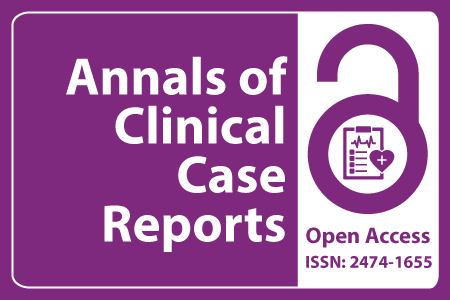
Journal Basic Info
- Impact Factor: 1.809**
- H-Index: 6
- ISSN: 2474-1655
- DOI: 10.25107/2474-1655
Major Scope
- Sleep Medicine and Disorders
- Family Medicine and Public Health
- Oncology Cases
- Sports Medicine
- Hepatitis
- Respiratory Medicine
- Trauma
- Emergency Medicine and Critical Care
Abstract
Citation: Ann Clin Case Rep. 2016;1(1):1039.DOI: 10.25107/2474-1655.1039
Nosocomial Pneumonia Induced by Short Mechanical Ventilation in an Infection-Prone Diabetic Patient who Underwent Cardiac Arrest due to Allergic Coronary Spasm
Maeda H, Takeguchi F, Kurata A and Yoshida K
Department of Forensic Medicine, Tokyo Medical University, Japan
Department of Nephrology, Tokyo Medical University, Japan
Department of Molecular Pathology, Tokyo Medical University, Japan
*Correspondance to: Ken-ichi Yoshida
PDF Full Text Case Report | Open Access
Abstract:
Ventilator-associated pneumonia (VAP) refers to nosocomial pneumonia occurring more than 48 hours of mechanical ventilation (MV). An elderly diabetic woman experienced cardiac arrest due to allergic coronary spasm upon piperacillin injection for postoperative endophthalmitis. She had a history of systemic anaphylactic reaction to a penicillin antibiotic. Catecholamine infusion and MV recovered her from cardio-pulmonary arrest within 15 minutes. Shortly thereafter, electrocardiogram showed ST changes reflecting severe left ventricular anterior wall ischemia. She was extubated before transfer to a university less than 3 hours after the cardio-pulmonary resuscitation. Echocardiography shortly post-transfer demonstrated full recovery of cardiac contractility. She was alert and presented no particular symptoms on day 2. Early on day 3, however, pneumonia was diagnosed from dyspnea, reduced O2 saturation, and pulmonary hypo-opacities, and progressed to death with sepsis on day 8. This case presents a unique type of pneumonia induced by brief MV, in contrast with the 48 hour’s requirement of MV for VAP. Retrospectively, serum procalcitonin after the successful resuscitation showed septic level, and would provide potential usefulness in the antibiotic administration for prevention of the pneumonia evoked by brief MV in infection-prone patients.
Keywords:
Acute coronary syndrome; Anaphylaxis; Cardiac arrest; Coronary spasm; Procalcitonin; Tryptase; Ventilator-associated pneumonia
Cite the Article:
Maeda H, Takeguchi F, Kurata A, Yoshida K. Nosocomial Pneumonia Induced by Short Mechanical Ventilation in an Infection-Prone Diabetic Patient who Underwent Cardiac Arrest due to Allergic Coronary Spasm. Ann Clin Case Rep. 2016; 1: 1039.













